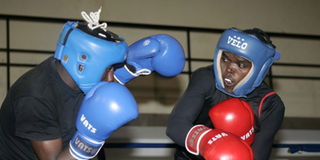Kenyan boxers fail to qualify for Olympics in Baku

Benson Gicharu (right) trains with Rayton Okwiri during a past training session at Kasarani. PHOTO | CHRIS OMOLLO |
What you need to know:
- Of the six pugilists, who represented Kenya in Baku, Gicharu was the only one who reached the quarter-finals.
- The standards of boxing in Kenya have progressively declined over the years since the national league format, which saw boxing clubs meet on a home and away basis, changed to the boxers only competing at one venue for three days.
Kenya’s boxing squad at the final World Olympic qualifiers in Baku, Azerbaijan performed dismally, with none reaching the semi-finals.
Bantamweight Benson Gicharu, the country’s sole male representative at the 2012 London Olympics, was highly tipped to cinch a ticket for the Rio Games.
Of the six pugilists, who represented Kenya in Baku, Gicharu was the only one who reached the quarter-finals.
The draw favoured him and the boxer skipped the first preliminary round. Gicharu then won his first contest against Emmanuel Ngoma of Zambia to reach the quarters.
However, Gicharu faced a tough Cuban opponent, Robeisy Ramirez, who comprehensively beat him on a unanimous point decision 3:0. The boxer’s handlers hoped that Ramirez would bag a gold medal so that Gicharu could finish fifth in the weight category to qualify. But Ramirez lost in the semi-finals to Ukraine’s Mykola Butsenko, who beat him on points 3:0.
The only other Kenyan, who won a bout in Baku was Aziz Ali in the heavyweight first preliminary round, but lost in the next one. The pugilist was required to win gold to qualify for the Olympics.
The other Kenyans, flyweight Simon Mulinge, lightweight Nick Okoth, middleweight Nick Abaka and heavyweight Elly Ajowi only needed to reach the semi-finals to assure themselves of a place at the Olympics.
The standards of boxing in Kenya have progressively declined over the years since the national league format, which saw boxing clubs meet on a home and away basis, changed to the boxers only competing at one venue for three days.
The previous format was competitive. It produced the late welterweight, Robert Wangila Napunyi, who gave Africa her first ever Olympic gold medal at the 1988 Seoul Games.





